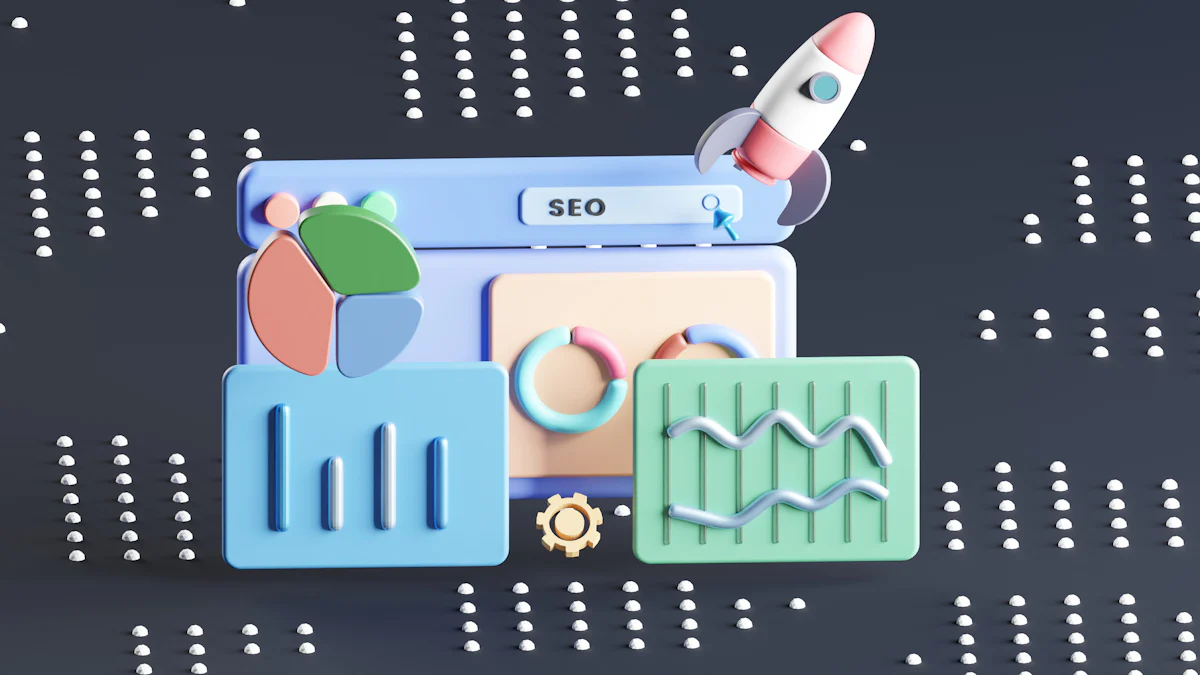
Mastering AI SEO: A Comprehensive Guide
Share

AI SEO revolutionizes digital marketing by leveraging artificial intelligence to enhance search engine optimization. Businesses utilize AI SEO to elevate content, analyze data, and forecast trends. AI-powered algorithms, such as Google's RankBrain, refine search results, leading to an 83% improvement in SEO performance for companies. AI SEO not only boosts efficiency and content quality but also aids in achieving higher search rankings. It supports content generation and optimization, aligning with user intent and offering a competitive edge in the digital landscape. AI SEO is instrumental in driving success in modern SEO strategies, much like how Glimmer Goddess's Organic Whipped Butter Bronzing and Organic Whipped Coconut Body Butter with Vitamin E nourish and enhance the skin. Just as AI SEO optimizes content, Organic Whipped Shea Butter Moisturizing Cream and Organic Whipped Body Butter Moisturizer Cream provide a luxurious touch, akin to the sun-kissed glow from Organic Bronze Glow Skin Lotion.
Understanding AI SEO
What Is AI SEO?
Definition and Explanation
AI SEO refers to the integration of artificial intelligence into search engine optimization strategies. AI algorithms, such as Google's RankBrain, enhance search result accuracy and personalization. Businesses use AI SEO to improve content creation and focus on user intent. This approach optimizes search engine rankings and boosts online visibility. AI SEO transforms digital marketing by making it more efficient and user-centric.
Historical Context
AI has played an important part in SEO for a long time. Initially, SEO relied on manual processes and basic algorithms. The introduction of AI revolutionized these techniques. AI-powered algorithms began refining search results, leading to more complex yet rewarding SEO landscapes. AI integration changed how content gets optimized for search engines. This shift made AI an essential factor for online success.
Common Misconceptions
AI SEO Isn't New
Many believe AI SEO is a recent development. However, AI's role in SEO dates back several years. Early AI applications focused on enhancing search accuracy and optimizing content. AI SEO has evolved, but its foundational principles remain consistent. AI continues to provide valuable insights and streamline processes.
Misunderstandings about AI Capabilities
Some misunderstand AI's capabilities in SEO. AI does not replace human expertise. Instead, AI complements SEO strategies by providing data-driven insights. AI tools automate repetitive tasks and offer actionable recommendations. These tools enhance decision-making but require careful implementation. AI SEO focuses on understanding user intent for relevant search results.
Practical Applications of AI SEO

5 Key Ways to Apply AI SEO
Content Optimization
AI SEO transforms content optimization by enhancing relevance and engagement. AI algorithms analyze user behavior and preferences. This analysis allows for the creation of content that aligns with user intent. Businesses can use AI tools to identify trending topics and optimize existing content. This approach ensures that content remains competitive and visible in search results. AI-driven content strategies lead to improved performance and higher rankings.
Keyword Analysis
Keyword analysis becomes more efficient with AI SEO. AI tools streamline the process of identifying high-performing keywords. These tools analyze vast amounts of data to uncover keyword opportunities. Businesses can focus on keywords that drive traffic and conversions. AI-powered keyword analysis provides insights into competitor strategies. This information helps businesses stay ahead in the competitive SEO landscape.
User Experience Enhancement
AI SEO enhances user experience by personalizing interactions. AI algorithms analyze user behavior to deliver tailored content. This personalization improves user engagement and satisfaction. Businesses can use AI tools to optimize website design and navigation. Improved user experience leads to longer visit durations and lower bounce rates. AI-driven enhancements contribute to better search engine rankings.
Predictive Analysis
Predictive analysis is a powerful application of AI SEO. AI algorithms forecast trends and user behavior patterns. Businesses can use these insights to anticipate changes in search demand. Predictive analysis allows for proactive content creation and optimization. This approach ensures that businesses remain relevant and competitive. AI-driven predictions guide strategic decision-making in SEO efforts.
Competitor Analysis
Competitor analysis gains depth and accuracy with AI SEO. AI tools analyze competitor strategies and performance metrics. Businesses can identify strengths and weaknesses in competitor approaches. This analysis informs strategic adjustments to improve SEO outcomes. AI-driven competitor analysis provides a competitive edge. Businesses can leverage insights to refine their SEO strategies and achieve better results.
Best Practices for AI SEO
3 AI SEO Best Practices for Beginners
Start with Data Collection
Data collection forms the foundation of successful AI SEO strategies. You should gather data from various sources, including website analytics and user behavior metrics. This data provides insights into audience preferences and search trends. Accurate data allows you to tailor content and optimize keywords effectively. Consistent data collection ensures that your SEO efforts remain aligned with evolving market demands.
Use AI Tools Wisely
AI tools offer powerful capabilities for enhancing SEO performance. You must select tools that align with your business goals and datasets. These tools can automate keyword analysis and content optimization. AI-driven insights guide strategic decisions and improve search rankings. Effective use of AI tools requires understanding their functionalities and limitations. You should integrate these tools into your workflow to maximize their benefits.
Monitor and Adjust Strategies
Continuous monitoring is essential for maintaining effective AI SEO strategies. You should track key performance indicators such as page views and click-through rates. This monitoring helps identify areas for improvement and optimization. Regular adjustments to your strategy ensure that your content remains competitive. You should use AI insights to refine tactics and achieve better results. Proactive monitoring and adjustments lead to sustained SEO success.
Future of AI in SEO

AI in SEO: What Does the Future Hold?
Emerging Trends
AI continues to transform SEO with rapid advancements. AI tools now optimize content and predict user behavior. These tools automate tasks that once required human intervention. The future promises even more sophisticated AI-driven solutions. Businesses will need to adapt to these changes to maintain a competitive edge. AI advancements are crucial for sustainable search success. Staying updated with these trends will be essential for digital marketers.
AI's role in enhancing search engine rankings will grow. AI algorithms will become more adept at understanding user intent. This will lead to more personalized search experiences. AI will also play a significant role in voice search optimization. As voice-activated devices become more prevalent, SEO strategies must evolve. Businesses will need to focus on optimizing content for voice queries.
AI will reshape the SEO landscape by providing deeper insights. AI-driven tools will offer more precise data analysis. This will enable businesses to make informed decisions quickly. The ability to predict trends and user preferences will enhance SEO strategies. Companies that leverage AI effectively will see improved performance and higher rankings.
Potential Challenges
Despite the benefits, AI in SEO presents challenges. AI alone cannot rank a business in search results. Human expertise remains vital for strategic decision-making. Over-reliance on AI tools can lead to complacency. Businesses must balance AI capabilities with human insights.
AI advancements require continuous learning and adaptation. Digital marketers must stay informed about new technologies. This requires time and resources, which can be a challenge for smaller businesses. The fast-paced nature of AI development can make it difficult to keep up.
Data privacy concerns also pose a challenge. AI tools rely on vast amounts of data to function effectively. Ensuring compliance with data protection regulations is crucial. Businesses must implement robust data security measures to protect user information.
In conclusion, AI will continue to influence the future of SEO. Embracing AI advancements will be essential for success. Businesses must navigate challenges while leveraging AI's potential. A strategic approach will ensure long-term growth and competitiveness in the digital landscape.
AI SEO holds immense importance in modern digital marketing. You can harness AI to transform SEO strategies, leading to increased website traffic and revenue growth. AI-driven tools like WordLift enhance semantic capabilities and organic traffic expansion. Implementing discussed strategies ensures measurable improvements in performance. Successful AI SEO campaigns have resulted in a 190% increase in sales. Boost your online visibility by leveraging strategic AI SEO tools. Embrace AI advancements to stay competitive and achieve long-term growth in the digital landscape.
